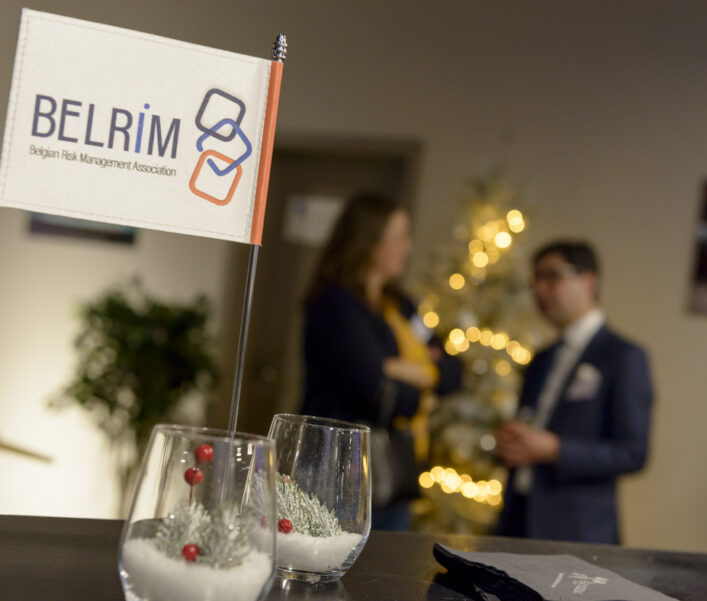What does it mean to you to win the Lifetime Achievement Award? Was this unexpected?
Filip Larrea: It was indeed totally unexpected and symbolically and emotionally a special event for me. The award refers to Johan Willaert with whom I worked for 23 years as part of Agfa’s BA programme. And for eight years even very intensely when I also became commercially responsible for the Agfa group. Johan, who you actually always addressed as Jo, and I have also become real professional friends. So finally receiving this Lifetime Achievement Award comes full circle for me, because within five months I will retire after having swum several waters in the insurance sector in a career of almost 40 years.
What was so special about Jo Willaert?
Filip Larrea: I could write a book about him, so to speak. In my professional career, I have experienced two outstanding figures and he is one of them. In a nutshell, he was a real broker/broker and I did not know any better. He once said to me that I was not THE commercial but I was a very good broker and I thought this, coming from him, was a fantastic compliment. He also put enormous energy into his networking, had a very good memory and great work ethic and was strategically strong. This was not always easy because you have to be able to deal with this. We never quarreled, but we had quite a few constructive discussions. However, once you had his trust, he was a strong partner. And together we formed a good tandem because we complemented each other.
How did you actually end up in the insurance sector so many years ago? Was it a coincidence or a conscious choice?
Filip Larrea: Pure coincidence. I am a lawyer by training and had taken insurance as an elective because it seemed interesting to me. I then graduated and while waiting for my army service, I did my internship as a lawyer. Once I was discharged, I then started in Guy Verhofstadt’s cabinet. But I never ultimately had the ambition, either to remain a lawyer or to go into politics although both were very interesting experiences. At some point, then, that cabinet falls and you really have to start looking for a job and then you start applying. I then had two options: in construction or insurance at Winterthur. I eventually chose the latter and since then I have never considered a real career switch.
Looking back on your career now, what appealed to you most about the industry?
Filip Larrea: What I always found most interesting and preferred to do is to combine the technical and commercial aspects. At the beginning of my career, I got into third-party liability insurance quite quickly: it was the most logical branch for me given my education. I built up solid technical knowledge at Winterthur, then also taught BA at the UPEA. And when I became a Field Underwriter at Hannover, I was able to use that technical knowledge to have good substantive discussions with the customers, especially brokers, to work out attractive offers with the aim, of course, of seeing an insurance policy underwritten at the end of the journey. When Hannover withdrew from the Belgian market, I took up the challenge of becoming a forester (or vice versa) instead of a poacher and started at Marsh, Antwerp office, on 1 July 2001. At Marsh, I had the pleasure of combining the role of Client Advisor with that of Client Executive for several years, specifically on the Agfa account. What has always attracted me in insurance is the reality of the corporate world, of their various questions and problems of all kinds. Especially as a broker, I found this extremely fascinating because in that capacity you have to find solutions to concrete problems. You have to be able to think out of the box. You have to try to find a constructive solution for the customer through good contacts with underwriters-insurers at all times. Creating a healthy foundation of trust and confidence with every underwriter in the market was important. I pursued this working on the basis of mutual trust and I dare say I succeeded.
What is it like working at such a large and international group like Marsh?
Filip Larrea: I has been very intense. Marsh is a big international group but working from strong local roots. It is that combination that makes a brokerage group strong. Anyway, you are dealing with large clients who are rightly demanding, with international programmes that have an impact on the entire business group, while at the same time you have to remain very accessible. Of course, I have absolutely no problem with all this, but working in that environment, caught between a big customer and a big insurer and striving for the best solution and the best price, is very intensive. In total, I have operated in such an environment for almost 40 years and it is now up to others to take up the torch. There are plenty of young, promising people willing and able to do so.
What is the biggest pain point of the insurance industry today?
Filip Larrea: Of course, I cannot really speak about the insurance companies and their internal evolution since I have been working at insurance broker Marsh for 23 years now. But I have seen a certain evolution come about within the sector. When I switched to Marsh, underwriters/insurers had great freedom to underwrite. Today, the word referral in particular is commonplace. Specifically, for difficult, technical risks, with special exposure, one no longer puts a quote on the table unless there have first been several referrals or referrals to headquarters, lead underwriters, regionally responsible underwriters and so on. That used to be based more on gut feeling and experience. That has now largely disappeared. It is not completely automated, I am certainly not going to argue that, but much more channelled. In short, there is a much greater hierarchical effect than there used to be.
Can you elaborate on this with a practical example?
Filip Larrea: At a certain point, you provide all possible info in a document that allows underwriters to put a price on the order (submission). I used to have the impression that you got that price much faster because underwriters had much more freedom to make their own decisions. Now I have the impression that, for example, a local insurer here in Belgium has to consult its parent company in the UK or Germany or wherever before the underwriter here can set the price. This does involve really big international programmes with significant exposure. Beware that is not a value judgment on my part but simply an observation. An underwriter endorsing a cause should in fact be able to think about it commercially for a bit. If that is no longer possible, then I fear that the insurance industry will increasingly fall into a tight straitjacket. I hope I will be proved wrong.
Should we then go back to the days of old?
Filip Larrea: To the days of old, which I did not experience, we certainly should not go back. Back then, a broker and an underwriter would have a good meal together and draw out on a beer mat how a difficult risk might be placed. Those times are long gone and thankfully so. I am certainly not advocating a return but the human aspect should still be present in day-to-day activity. It is exactly that human interaction that makes sure you get certain things through as a broker. The danger is that under the guise of being able to have and keep everything under control, you push that human interaction to the back burner. Why has it become much more important to fill in the right little document than to contact the underwriter in order to be able to have a discussion on a particular matter?
And how would you explain this trend?
Filip Larrea: I think everything has become much more formal because from the mother house they want to keep maximum control over all local endorsements. I say again, it is not a value judgment and I even think that is logical. It is normal that one is not going to assess heavy risks differently in Asia than in Europe or anywhere else in the world. Besides, the fact that everyone is taking a more structured approach is a natural evolution because insurers also all know very well what is happening in the world with certain risks and activities. They then also have their databases and their target rates, which means there is more uniformity. It is difficult today to attract young people into the insurance and risk management sector.
Given your years of experience, how would you convince young people to enter the sector?
Filip Larrea: I think this is a very difficult question because it cannot be answered in an unqualified way. One thing is certain: you really have to have the ambition to think, work and operate internationally. If I were personally starting over and with what I know now, as a young person I would only enter the insurance sector if I can effectively fulfil that international ambition. Because that is the added value of getting into the industry: being willing to get out from under the church tower and look for opportunities on my own to be allowed to start in the UK, France or anywhere else in the world. Because for me, that’s the way to go. At least then you end up in an international group because an insurer or large broker is internationally oriented just as by definition all BELRIM and Ferma members are. If you only want to stay in Flanders, the sector has its limits.
Isn’t there a danger that young people will turn their noses up at the tighter straitjacket in which the sector operates?
Filip Larrea: The biggest challenge for the insurance sector is to remain attractive and appealing to young people and, once they have been recruited, to be able to keep them. The standardisation of a lot of things and the increased administration simply curtails people’s creativity. And if you take away the challenge for a young and dynamic person, you have a problem. Both brokerage and insurers will have to pay attention to this. One will have to leave enough room for people to do their thing.







